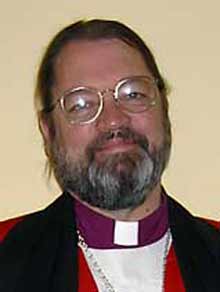CBC News [Canada]
January 5, 2007
http://www.cbc.ca/canada/story/2007/01/05/native-bishop.html
The Anglican Church of Canada, still paying for an era when native children were forced into church-run residential schools, has recruited a bishop from Alaska to be its first indigenous bishop for all Canada.
Mark MacDonald, 51, is to take on the job in March after 9½ years as Episcopal bishop of Alaska. The Episcopal Church, like the Anglican, is an offshoot of the Church of England.
An official church account links the new position to shame felt by Anglicans for the treatment of native children taken from their homes to be educated in schools the church operated for the federal government for much of the last century.
 |
| Mark MacDonald, bishop of the U.S. Episcopal diocese of Alaska, is moving to Canada to be the Anglican Church's national indigenous bishop. Photo by the Anglican Church of Canada |
Thousands of claims of physical and sexual abuse eventually left the Anglicans (like the Roman Catholic, United and Presbyterian churches, which had their own schools) with huge legal and financial liabilities. In British Columbia, the Anglican Diocese of Cariboo, with legal bills totalling more than $350,000, declared bankruptcy, and a former dormitory supervisor was imprisoned for sexually abusing boys.
MacDonald, whose title will be national indigenous bishop, was born in Duluth, Minn., to parents of mixed native and European descent. He earned a master's degree in divinity at Toronto's Wycliffe College and was a clergyman in Mississauga, Ont., before returning to the United States.
Archbishop Andrew Hutchison, Toronto-based primate (national leader) of the Anglican Church, said the new post is different from any other.
"We have many indigenous clergy and even a few indigenous bishops as members of our house of bishops," Hutchison told CBC Online.
But no existing bishop has a national jurisdiction or an exclusive focus on native people, he said.
In some ways, MacDonald's role will be "similar to the role of myself, the primate, in that he will not have a geographic diocese, nor do I. He won't have a cathedral, nor do I," Hutchison said.
Among other responsibilities, "he will be a pastoral support to bishops across Canada in exercising their indigenous ministries and he will be a voice of advocacy within the councils of the church for native concerns," the archbishop said.
The appointment of a national indigenous bishop was proposed at a meeting of native Anglicans in 2005 and quickly approved by the primate and bishops from across Canada.
A statement issued by the church in 2006 traced the roots of the decision to the 1960s, when Anglicans recruited sociologist Charles Hendry to investigate the church's relations with native people.
Non-aboriginal Anglicans 'stung' with shame
"Hendry gave first-hand accounts by former residential school students and his words stung non-aboriginal members of the church with shame and confusion," the document said.
The new bishop, it said, "will have spiritual support from the whole church and will be monetarily supported so the indigenous Anglican Church stands strong and independent of any subordination.
"The provision of this bishop is a first step in a new era for the indigenous Anglican Church."
In 2002, the Anglican Church signed a deal with the federal government under which it will pay up to $25 million to compensate former residential school students.
That sum "far exceeds the assets of the general synod of the Anglican Church" and all dioceses would be asked to contribute to the settlement, Archbishop Michael Peers said at the time.
The church is still well short of its goal, having gathered more than $18 million toward the settlement so far. Anglican officials have said they hope Ottawa will agree to reduce the church's burden to about $16 million.
Any original material on these pages is copyright © BishopAccountability.org 2004. Reproduce freely with attribution.